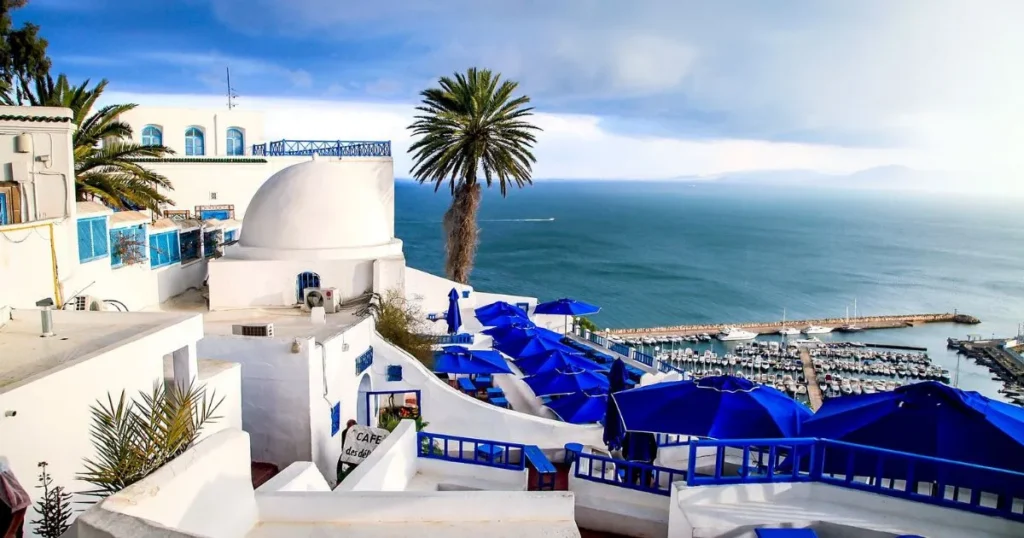Traveling to Tunisia means diving into a world of history, culture, and stunning views. The country’s mix of ancient ruins, beautiful beaches, and lively cities has something for everyone. From the start, you’ll find yourself in a place of wonder. are you ready to explore Tunisia’s best spots with this Tunisia travel guide ?
Your trip to Tunisia will lead you to amazing places, each with its own tale. Whether you love history, culture, or beach time, Tunisia promises unforgettable memories. Its friendly people and stunning landscapes will leave you inspired and refreshed. and This Tunisia travel guide will help you plan the perfect journey.
If you have traveled to Morocco, traveling to Tunisia is a similar but not identical experience, Tunisia has its own charm too.
Table of Contents
Key Takeaways
- Discover the ancient ruins of Carthage and other historical sites that showcase Tunisia’s rich history
- Explore the vibrant culture of Tunisia, including its music, art, and cuisine
- Relax on the stunning Mediterranean beaches and enjoy the country’s beautiful coastline
- Experience the warm hospitality of the Tunisian people and their welcoming culture
- Plan your trip with our ultimate Tunisia travel guide, covering the best places to visit and things to do
- Get ready to immerse yourself in the unique blend of Tunisia tourism, from adventure to relaxation
- Make the most of your travel to Tunisia and create unforgettable memories in this incredible destination
Introduction to Tunisia: Where Ancient History Meets Mediterranean Charm
Tunisia is a country that mixes ancient history with Mediterranean charm. It’s perfect for a unique Tunisia vacation. As you explore, you’ll find a rich cultural heritage from its strategic Mediterranean position.
The country’s history spans from the ancient Phoenicians to today’s Tunisians. The Tunisian culture is a mix of Arab, Mediterranean, and African traditions. You’ll see this in its food, buildings, and friendly people. Exploring local markets and souks, you’ll find traditional crafts and tasty local foods.
The Best Time to plan a Visit Tunisia
The best time to visit Tunisia is in spring and autumn. The weather is mild and perfect for exploring. You can see the coastal towns and desert oases during these months.
Understanding Tunisia’s Diverse Regions
Tunisia has a wide range of geography, from the Mediterranean coast to the Sahara Desert. Some top places to visit include:
- The coastal town of Sousse, known for its beautiful beaches and historic medina
- The desert oasis of Tozeur, famous for its palm groves and traditional Berber villages
- The capital city of Tunis, which offers a unique blend of modern and traditional attractions
What Makes Tunisia travel Unique
Tunisia is special because of its history, culture, and natural beauty. You can see ancient ruins like Carthage and beautiful Mediterranean beaches. A Tunisia vacation is unforgettable, offering something for everyone. With its rich Tunisian culture and friendly people, you’ll feel right at home.
Essential Tunisia Travel Guide Tips
Planning a trip to Tunisia? It’s key to know the local customs and traditions. Tunisia’s history is rich, and its beaches are perfect for relaxation. Here are some tips to make your Tunisia Travel great:
Accommodation options range from luxury hotels to cozy guesthouses. You can stay in busy cities or quiet coastal towns. For getting around, use public transport or rent a car. Remember to always wear your seatbelt and follow local traffic rules.
To stay safe, be mindful of your surroundings, mainly in crowded places. Keep your belongings close and don’t carry too much cash. Here are some Tunisia travel tips to keep in mind:
- Respect local customs and traditions, specially when visiting mosques or other religious sites
- Learn a few basic Arabic phrases, such as “hello” and “thank you”
- Stay hydrated and bring sunscreen, as the Mediterranean sun can be strong
By following these Tunisia travel tips, you’ll have a safe and fun trip . Whether you want to explore the history or relax on the beaches, you’ll have an amazing time. Tunisia offers a mix of African, Arab, and Mediterranean cultures, making it a place for everyone.
Exploring the Ancient Ruins of Carthage
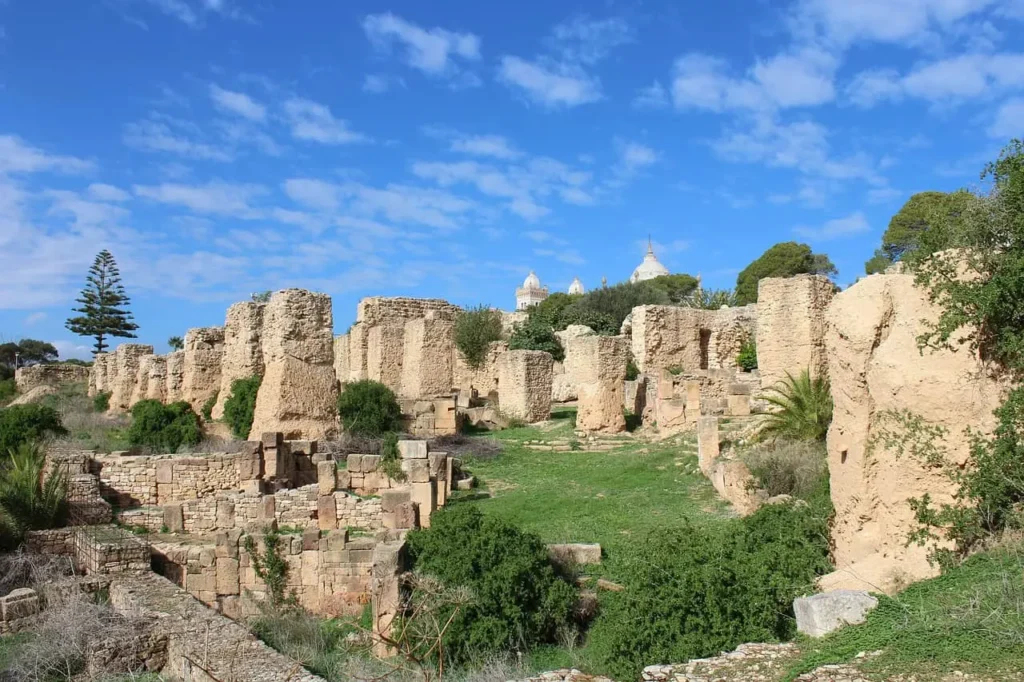
When you travel to North Africa, don’t miss the ruins of the Ancient Carthage established by . This place is full of history. You’ll see the Roman Amphitheater, the Punic Port, and the Antonine Baths.
Carthage was a key city in the Mediterranean’s past. Its location made it a center for trade and economy. This history still shapes the culture in the area today.
Must-See Archaeological Sites
- The Roman Amphitheater, a testament to the city’s grandeur
- The Punic Port, a reminder of Carthage’s maritime prowess
- The Antonine Baths, a showcase of ancient engineering and architecture
Planning your visit is important. Know the opening hours, ticket prices, and guided tours. This way, you can enjoy your time at the ruins and learn more about its history.
Discovering the Medina of Tunis
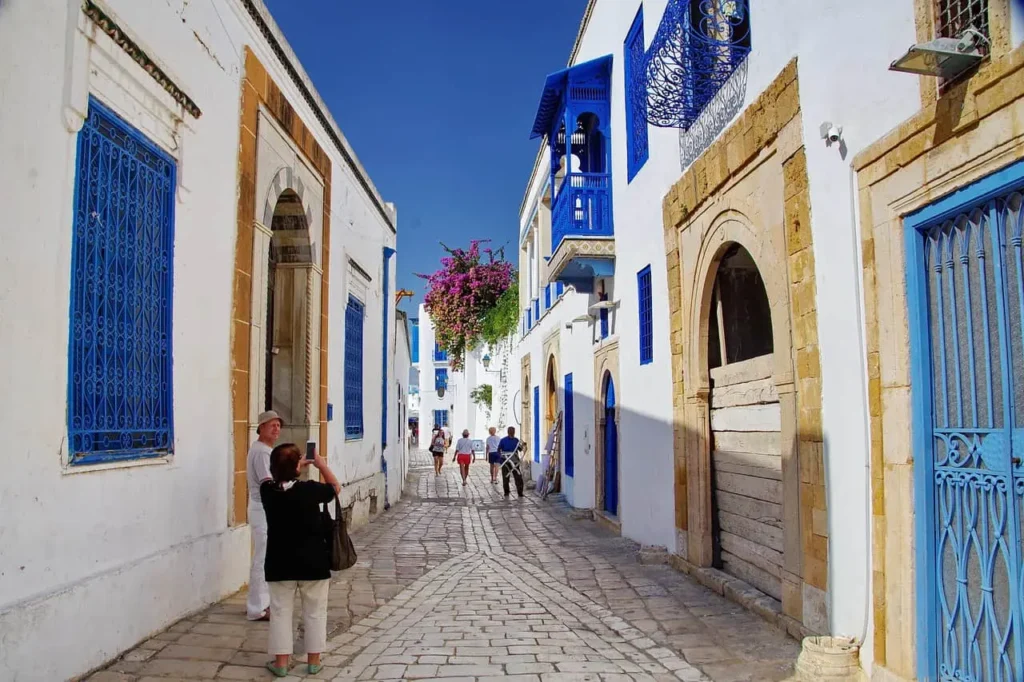
Exploring the Medina is a highlight of Tunisia travel attractions. This old city is filled with narrow streets, lively markets, and beautiful architecture. It’s a glimpse into traditional Tunisian life, with sounds of prayer calls, smells of fresh bread, and colorful handicrafts.
Walking through the Medina, you’ll uncover its rich history and cultural importance. Each quarter has its own vibe, from busy souks to peaceful mosques and madrasas. You’ll learn about local customs and experience the Tunisians’ warm welcome, making your trip truly immersive.
Some top activities in the Medina include:
- Exploring the vibrant souks, where you can find everything from spices and textiles to jewelry and handicrafts
- Visiting the stunning mosques and madrasas, such as the Mosque of Muhammad Bey and the Madrasa of Al-Husayn
- Sampling the local cuisine, including delicious dishes like couscous, harissa, and brik
The Medina of Tunis is a must-see for anyone planing a Tunisia travel . It offers a mix of traditional and modern charm. It’s the perfect spot to experience Tunisia’s best and make lasting memories.
Sahara Desert Adventures: From Douz to Tozeur
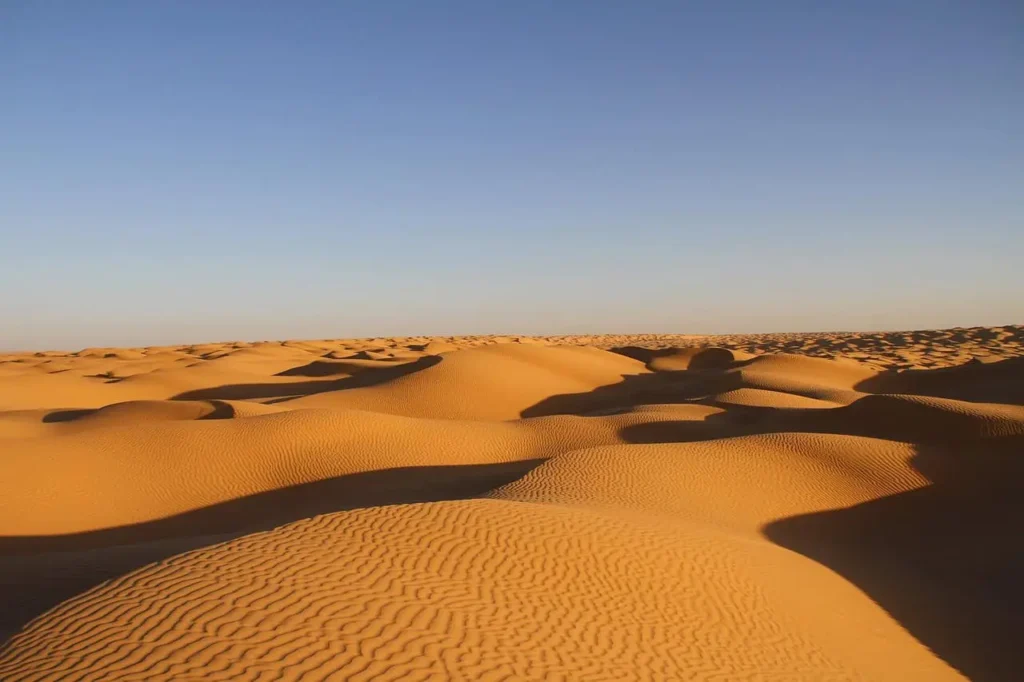
When you plan your Tunisia Travel, don’t miss the Sahara Desert. It’s a mix of adventure and learning about Tunisian culture. The endless sand dunes, breathtaking sunsets, and friendly desert people create memories you’ll always treasure.
There are many fun activities to try, like camel riding, sandboarding, and gazing at the stars. Here are some tips to enhance your desert adventure:
- Choose a reputable tour operator for a safe and fun trip.
- Bring important items like sunscreen, a hat, and comfy clothes.
- Drink lots of water to stay hydrated during the day.
Exploring the Sahara Desert lets you see oasis towns like Douz and Tozeur. These places show you traditional Tunisian culture. They are famous for their stunning buildings, lively markets, and tasty food. The Sahara Desert is perfect for anyone looking for history, adventure, or a unique place to relax.
Coastal Gems: Mediterranean Beaches and Resort Towns
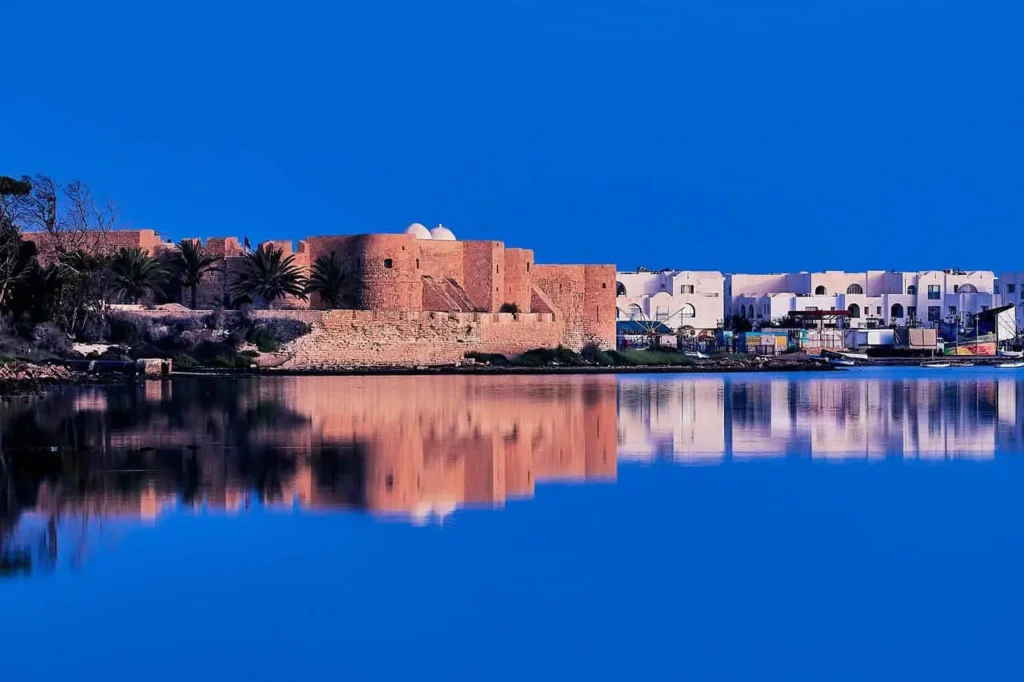
Exploring Tunisia’s coastline reveals a wealth of Mediterranean beaches and resort towns. These places highlight the country’s history and natural splendor. From Hammamet and Sousse to the north coast’s hidden gems, there’s a spot for every traveler.
Planning your beach getaway? Here are some tips:
- Find a resort that matches your preferences, whether you want to relax, seek adventure, or a bit of both
- Indulge in the local seafood, known for its freshness and flavor
- Take a leisurely walk along the beach and marvel at the Mediterranean views
In the evenings, the coastal towns come alive. You can enjoy traditional Tunisian food, browse local crafts, and feel the energetic vibe. Tunisia’s coastal spots offer a perfect mix of history, culture, and nature, making them a top choice for Mediterranean travel lovers.
Traditional Tunisian Culture and Cuisine
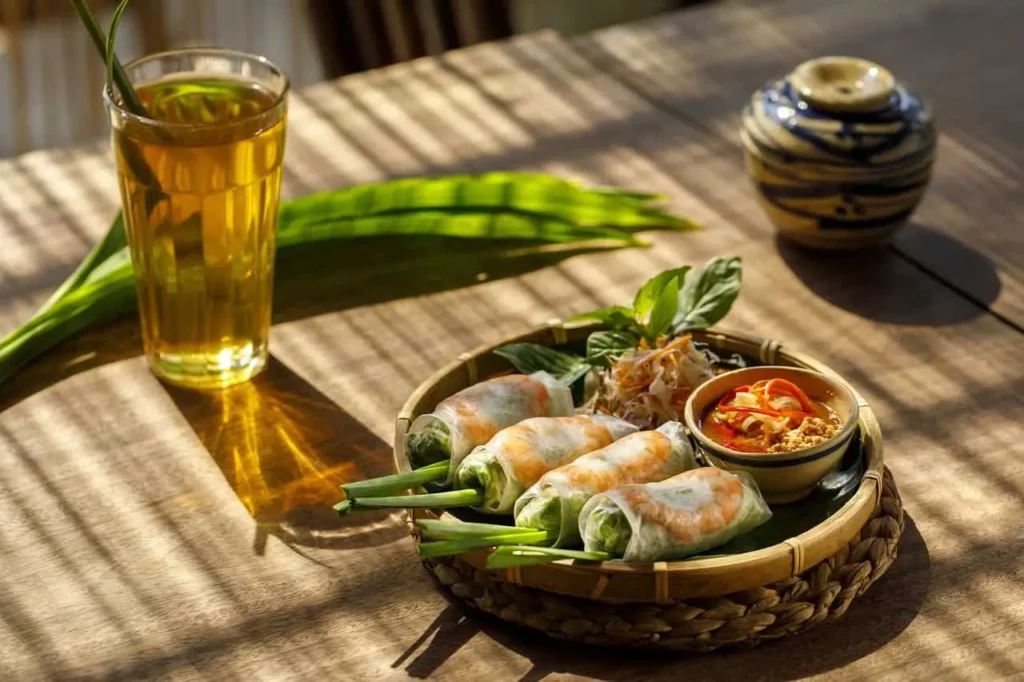
Traveling through North Africa means diving into local culture ,this Tunisia travel guide insights help you discover the Tunisian culture : is a mix of Arab and Mediterranean, offering a rich experience. and Its cuisine is a tasty way to see the country’s history and traditions.
Trying local foods is a must. You’ll find dishes like couscous, harissa, and brik. These dishes are not just tasty but also show the country’s culinary heritage. Exploring markets and souks lets you try these dishes and learn about cultural customs.
Local Delicacies to Try
- Couscous: a traditional North African dish made from steamed semolina flour
- Harissa: a spicy chili pepper paste commonly used in Tunisian cuisine
- Brik: a savory pastry filled with tuna, capers, and eggs
Cultural Customs and Etiquette
Respecting local customs is key when interacting with locals. For instance, in souks, haggling and dressing modestly are common practices. Embracing these customs makes your experience more authentic and shows respect for the culture.
Transportation and Accommodation Options in Tunisia
Planning your trip to Tunisia means looking at different ways to get around and where to stay. Tunisia has many choices for every budget and taste. You can travel by taxi, bus, or train, which are all easy on the wallet.
When it comes to places to stay, Tunisia has hotels, guesthouses, and apartments. Each offers a special experience. Think about location, cost, and what’s included. Researching and comparing options helps find the perfect spot. Popular spots include the medina of Tunis, Sousse by the sea, and Tozeur in the desert.
Getting around is easy with public transport, car rentals, or taxis. Here are some tips from this Tunisia travel guide:
- Always use licensed taxis and set the fare before you go
- Rent a car from a trusted company and make sure you have all the papers
- Public transport like buses and trains is both cheap and efficient
Knowing your options for travel and lodging lets you enjoy Tunisia fully. Whether you want to relax, explore, or dive into culture, Tunisia has it all.
Conclusion: Making the Most of Your Tunisian Adventure
As your Tunisian adventure comes to an end, think about all you’ve seen and done. You’ve explored ancient ruins like Carthage and walked through the vibrant medina of Tunis. The Sahara Desert and Mediterranean beaches have made unforgettable memories for you.
You’ve also experienced the Tunisians’ warm welcome and tried their delicious food. You’ve learned about their traditions. Don’t forget to respect their customs and explore the souks for a real shopping experience.
To get the most out of your trip, think about joining guided tours or day trips. This will help you see more and discover hidden spots. Stay safe by knowing the local laws and customs. Enjoy making memories and diving into Tunisian culture as you say goodbye to this amazing place.
FAQ
What are the best places to visit in Tunisia?
Top spots in Tunisia include Carthage’s ancient ruins and the Medina of Tunis. Don’t miss the Sahara Desert and coastal towns like Hammamet and Sousse.
When is the best time to visit Tunisia?
Spring (March to May) and fall (September to November) are the best times. The weather is mild, and there are fewer crowds.
How can I get around Tunisia?
Tunisia has taxis, buses, and trains for transport. Renting a car lets you explore at your own pace.
What are the must-see archaeological sites in Tunisia?
Must-see sites include the Roman Amphitheater, Punic Port, and Antonine Baths in Carthage.
What should I know about the Medina of Tunis?
The Medina of Tunis is the historic old city. It’s known for its narrow streets, markets, and historic mosques. Exploring it is a must for visitors.
What kind of desert activities can I do in Tunisia?
In the Sahara Desert, try camel trekking, sandboarding, and stargazing. You can also stay in oasis towns and accommodations.
What are some of the best coastal gems in Tunisia?
Tunisia’s coast has beautiful beaches and resort towns. Hammamet and Sousse are popular spots.
What traditional Tunisian cuisine should I try?
Try couscous, harissa, and brik. Also, explore local markets and souks for a true cultural experience.
How can I stay safe while traveling in Tunisia?
Stay safe by being aware of your surroundings. Avoid carrying too much cash. Follow local customs and etiquette.
